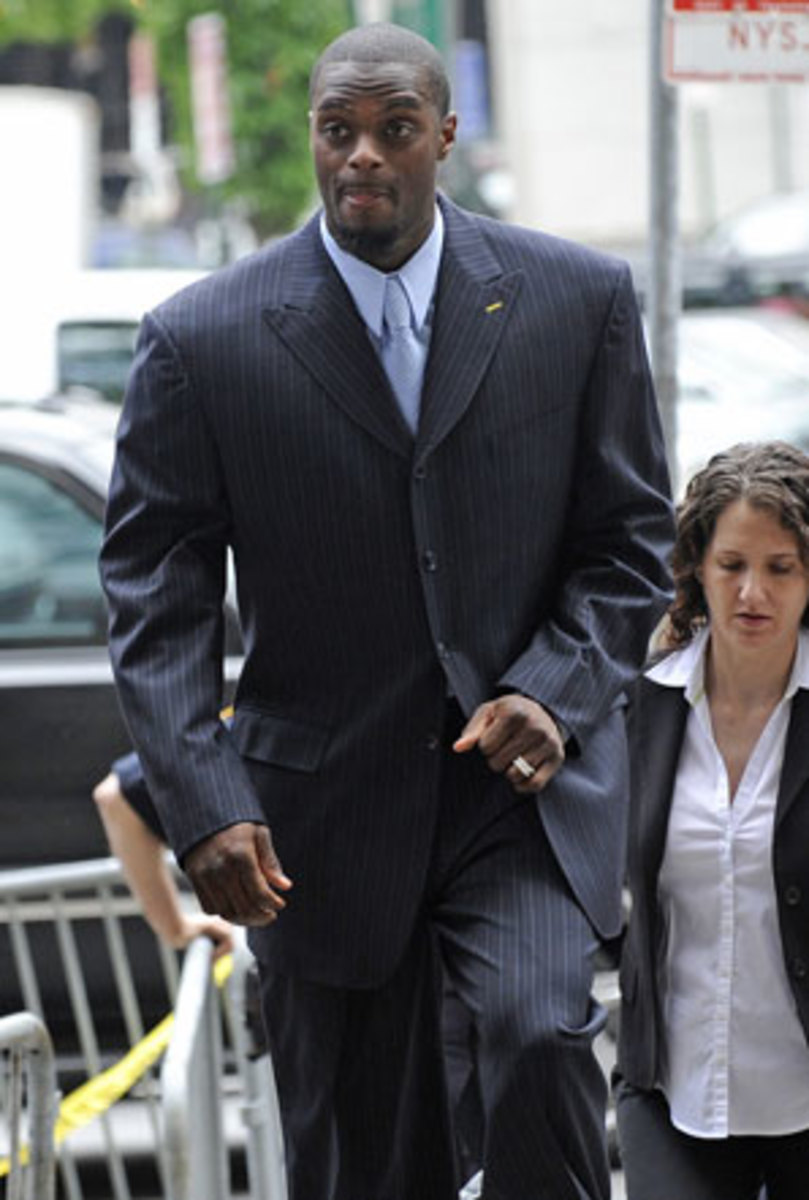
Prison likely for ex-Giant Burress
As Plaxico Burress discovered this afternoon, Hail Mary passes are about as successful in court as they are on the field. As expected, the former New York Giants wide receiver was indicted today on two counts of criminal possession of a weapon in the second degree, and one count of reckless endangerment in the second degree. His trial is scheduled for Sept. 23, although it is possible that prosecutors and Burress' attorney, Benjamin Brafman, could work out a plea deal prior to that date.
In his appearance before a Manhattan grand jury last week, Burress had hoped to persuade jurors to overlook the technicalities of the law and refrain from indicting him. After all, Burress did not intend to commit a crime when carrying a .4 caliber Glock semiautomatic pistol into Manhattan's Latin Quarter nightclub last November. In accidentally shooting himself in the thigh, he was also the only person injured by his misdeeds. By putting a human face on the alleged possession crime, Burress may have also attempted to convince jurors of the excessiveness or unfairness of a law that imposes a minimum three-and-half-year prison sentence for mere possession of a loaded gun.
As the player who caught the winning touchdown pass in the Giants' stunning Super Bowl victory in 2008, Burress may have also believed that a group of New York citizens impaneled for a jury would take kindly to him. Burress would not have been the first celebrity to receive preferential treatment in court.
Unfortunately for Burress, the grand jury apparently disregarded both his narrative and fame and, instead, applied the letter of the law, which in this case is as unforgiving as it is clear. In New York, it is a felony to possess a loaded, unlicensed handgun outside of one's home or place of business. Unless Burress can show that he somehow did not possess the gun when he shot himself -- a circumstance that seems hard to imagine, let alone visualize, since he was purportedly carrying the gun in the waistband of his pants -- then he will have committed the crime.
Today's indictment is a victory for Manhattan district attorney RobertMorgenthau and New York City Mayor Michael Bloomberg, who has repeatedly advocated that Burress be prosecuted to the fullest extent of the law. It is similarly a victory for gun control advocates and for those who believe that athletes and celebrities should not receive preferential treatment.
Although Burress faces the minimum sentence, prosecutors appear willing to accept a plea deal whereby Burress, a first-time offender, would plead guilty to a lesser offense and thus be sentenced to a shorter period behind bars. It is thought that prosecutors would agree to a two-year prison sentence, which, with good behavior and other factors, Burress might be able to shorten by several months. Still, absent a more successful Hail Mary attempt in a trial, it appears certain that Burress will be headed to prison.
Although unlikely, the trial version of a Hail Mary could come in the form of a constitutional challenge to New York law. Last year, in District of Columbia v. Heller, the U.S. Supreme Court held that the Second Amendment guarantees the right of individual U.S. citizens to keep and bear arms while at home. On the surface, it seems unlikely that Burress' legal team could use Heller to argue that New York's law also violates the Second Amendment. Heller concerned a Washington D.C. prohibition on owning certain firearms -- including in one's home -- whereas New York's law concerns possession of certain firearms outside of one's home (or place of business). Still, Burress may contend that his situation is not so dissimilar from the legal challenge brought in 2003 by D.C. resident Dick Heller. Burress could assert that both he and Heller were merely exercising their right to bear arms under the Second Amendment.
While a constitutional law case emanating from Burress' legal woes might be engaging to imagine, it remains far-fetched. The more plausible scenario is that Burress will be spending time behind bars.
Michael McCann is a law professor at Vermont Law School and the distinguished visiting Hall of Fame Professor of Law at Mississippi College School of Law. He is a former chair of the Association of American Law Schools' Section on Sports and the Law.





